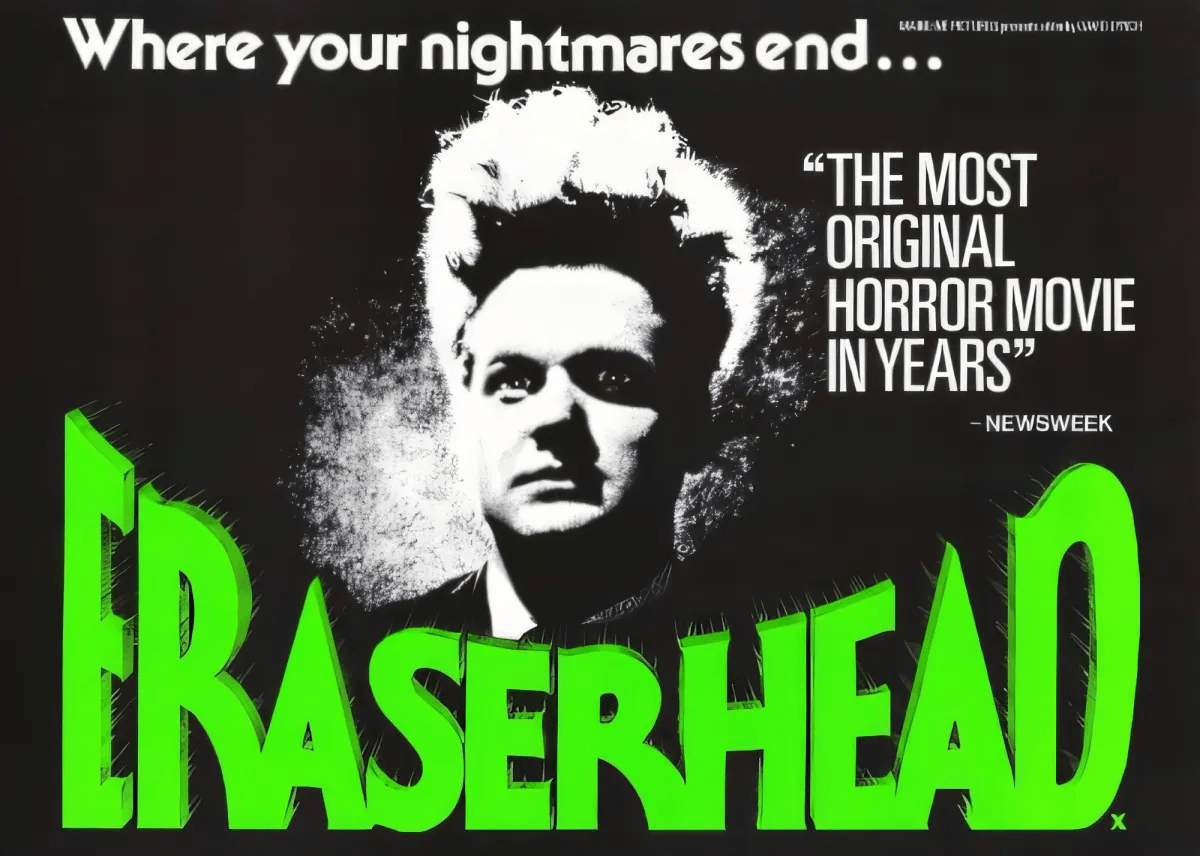Is David Lynch's Directorial Debut Eraserhead Suitable For Casual Moviegoers?

Released in the spring of 1977, young directing upstart David Lynch released his debut feature film Eraserhead, after years of difficulty getting the low-budget movie off the ground. Even nearly 40 years after its release, Eraserhead is a cult film that has sparked a plethora of fan theories and wholehearted debates to this day.
Based on a fairly simplistic premise, the black and white science fiction film sees seemingly average joe Henry Spencer ( played by Jack Nance) burdened with a newborn baby. Only this baby is a creature more in line with an interdimensional visitor than the average Gerber mascot.
As a sharp contrast to the horror/sci films of the 1970s, David Lynch decides to engulf Eraserhead in an entirely black and white color palette, which may act as a subtle homage to the classic Universal monster films of the 1930s, 40s, and 50s. Lynch would repeat the same stylistic technique with his Academy Award-nominated feature film The Elephant Man, another psychological cult drama starring an unusual protagonist.
While Eraserhead may follow the conventional three-act structure of most films, the movie itself is built off of a sci-fi fantasy fever dream. Similar to a variety of future David Lynch projects, the director isn't inclined on giving up any answers from the start.
Little if any details are revealed regarding the significance of Henry's distinct hairstyle, the location of the industrial environment, the origins of the alien baby, or a certain singer revealed toward the second act of the movie. It's all mostly left up to the interpretation of the audience member, which may be a good or bad thing. Lynch is not a director that everyone will gravitate towards, but he is a filmmaker highly respected for his tendency to take risks and create a never-ending puzzle of secrets for his audience.
Shaking Up The Genre
As Eraserhead takes a deeper dive into Henry's psyche, the film only continues to become more confident in its weirdness, as Lynch does not hold the hand of the audience and casually moves his story along without a hitch. By the second act, the general enigma of the film is even less close to being unraveled than the opening 20 minutes.
Rather than abandon his child, Henry comes in to take responsibility for his own and looks after the creature like a true parent. While the baby may be a startling image to become accustomed to, Henry's relationship with his girlfriend Mary X (Charlotte Stewart) and their alien child grounds the movie in a way that may seem familiar to displaced viewers. In fairness, Eraserhead is a film that benefits from several viewings, given that it is chock full of innuendos and imagery.
Viewing a film again with a different set of lenses can be even more rewarding than letting a movie set for a designated amount of time. A casual audience member may feel at home with Lynch's follow-up 1980 feature The Elephant Man, but Eraserhead is not a movie that will do any favors for carefree viewers. It's less forthcoming with its answers than most movies and even more unspecified with the ultimate outcome.

An Irregular Narrative Structure
At the heart of all this eeriness and unbearable experiences is the clamorous chime of a radiator. While David Lynch's original fan-favorite television program Twin Peaks (1990-1991) may cloak its strange qualities in the form of a classic murder mystery, Eraserhead opts out of the small town murder for a unique family dynamic.
Though Eraserhead may not be a horror film in the general sense of the word, Lynch's debut film is not a venture that ultimately relies on gore or jump scares but psychological horrors of the mind. From the opening introduction, viewers are treated to a shirtless disfigured man perched in shadow by a window, a fetus pile descending from the sky, and the titular Ersaerhead character Henry hovering over a silhouette of the moon.
From that point on, Eraserhead takes a deep dive into the dark and demented psyche of a man who becomes the caregiver for a newborn child. Before an audience can comprehend the true nature of the world in which these questionable characters occupy, the film takes another disturbing turn to a deformed woman singing at her lonesome surrounded by complete darkness and joyful carnival music. This woman (played by Laurel Near) has been dubbed as the "Lady in the Radiator" and represents the frightening imagery associated with the film and its psychological horror undertones.

Each forthcoming image is more disturbing and engrossing than the last. If Eraserhead were released in the current film landscape, the reception gained toward the film may not have been the same. The age of auteur directors was gaining traction in the early 1970s, while current Hollywood largely prides itself on sequels and reboots to drive their enterprise.
The attention span of audience members has already begun to wane and the tale of Henry and his dying alien child is a film that greatly relies on that attention. If anyone has begun to falter at any point, they run the risk of losing out on a few minutes yet key details regarding Lynch's vision of the movie.
The General Verdict
Throughout the years, David Lynch has garnered a stable reputation for creating films that fascinate and challenge the mind's imagination but may not be the most coherent piece of entertainment. Even Lynch's more commercial efforts such as The Elephant Man and 1984's Dune have their uncanny qualities about them in more ways than one.
Through his substantial resume, Lynch's films and work in television have inspired countless creators and auteurs working in the entertainment division. Even in its most complex moments, Eraserhead is a film that deserves to be watched and passed along to others for their viewing pleasure. Eraserhead certainly won't be an easy watch, but it will be a watch that will render within the brain for some time, and it's those films that make an audience transfixed by the moviegoing experience.
Opinions and Perspectives
The fact that Lynch won't explain the meaning makes it even more fascinating to discuss.
Love how this sparked Lynch's whole career. You can see elements that he developed in his later works.
The way Lynch portrays domestic anxiety is so raw and honest, despite the surreal elements.
My girlfriend walked out halfway through. I finished it alone. Worth it though.
It's amazing how influential this movie became considering its modest budget.
The imagery stays with you long after the film ends. I'm still thinking about certain scenes months later.
Not sure about the casual viewer part, but serious film fans should definitely watch it.
I keep coming back to the dinner scene. It's uncomfortable in all the right ways.
The way Lynch uses silence is just as important as the industrial sounds.
The scene transitions are so seamless, like a dream flowing from one moment to the next.
The way it portrays isolation in an urban setting feels very relevant today.
I appreciate the craft but I never want to watch it again. Once was enough for me.
Some scenes feel like they came straight from a fever dream. Lynch really knows how to tap into our subconscious fears.
Each time I watch it I have a different interpretation. That's what makes it a masterpiece.
Charlotte Stewart deserves more credit for her performance as Mary. She captures that character's instability perfectly.
The film works better if you don't try to understand everything. Just let it wash over you.
I agree about the black and white choice. The contrast makes everything more mysterious and unsettling.
The pacing is deliberately slow, but that's what makes it so effective. It builds dread perfectly.
I love showing this to friends who think they've seen everything. Their reactions are priceless.
The film's influence on horror cinema is undeniable. You can see bits of it in so many modern psychological thrillers.
The way Lynch portrays parental anxiety is brilliant. It's like a fever dream of new parent fears.
I watched this at midnight alone. Worst decision ever. Couldn't sleep afterward.
Anyone else think the industrial sounds are meant to represent Henry's mental state?
The relationship between Henry and Mary feels so real despite the surreal environment.
I actually find it more accessible than some of Lynch's later works like Inland Empire.
The Lady in the Radiator singing In Heaven is both beautiful and terrifying. Pure Lynch.
Watching this film changed how I think about experimental cinema. It showed me movies don't need traditional narratives.
The scene where Henry cuts into the baby haunts me to this day. I can't unsee it.
I understand why some people hate it, but that's what art should do sometimes make us uncomfortable.
The baby prop still looks disturbing today. I can't imagine how audiences reacted in 1977.
Just because a film is unique doesn't make it good. I found it self-indulgent and boring.
The industrial setting reminds me of my hometown. Maybe that's why it resonated with me so much.
My film professor said this movie is about the fear of parenthood. After becoming a parent myself, I totally see it.
I actually find it funny in a dark way. The awkward family dynamics feel weirdly relatable despite the surreal setting.
The dinner scene with Mary's family is pure psychological horror without any jump scares. Pure genius.
I showed this to my roommate who only watches Marvel movies. Big mistake. He left after 20 minutes.
The practical effects hold up remarkably well after all these years. Modern CGI would have ruined the organic creepiness.
This movie feels like a nightmare you can't wake up from. I mean that as a compliment.
You're absolutely right about the sound. I actually had to lower my volume during certain scenes because it was so intense.
Jack Nance's performance as Henry is seriously underrated. His facial expressions tell such a complex story.
The sound design deserves more recognition. Those industrial noises create such a claustrophobic feeling throughout the whole film.
Not every film needs to spoon-feed its audience. I love how this movie leaves so much open to interpretation.
I've watched it three times now and I notice something new each viewing. The fetus imagery in the opening sequence still puzzles me.
Lynch took five years to make this film and I believe every minute was worth it. The attention to detail is incredible.
Anyone else notice how the radiator lady scenes seem to represent Henry's escape from his parental responsibilities? That's my interpretation anyway.
The black and white cinematography adds so much to the unsettling atmosphere. I can't imagine this film having the same impact in color.
I respectfully disagree. While it's artistically interesting, I think the film is needlessly obscure and pretentious.
This film isn't meant for casual viewing, but that's exactly what makes it special. Lynch created something truly unique here that still influences filmmakers today.
The baby scenes literally gave me nightmares. I had to turn on all the lights in my apartment after watching it.
I finally watched Eraserhead last night and I'm still processing what I saw. The industrial soundscape really got under my skin in a way I wasn't expecting.
